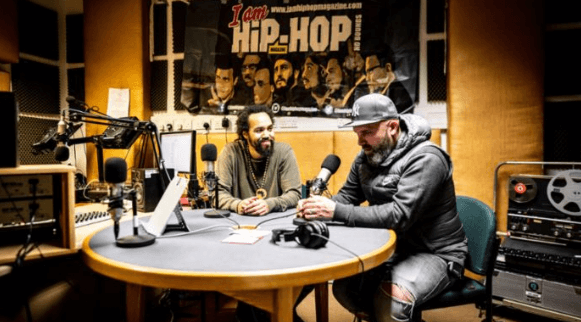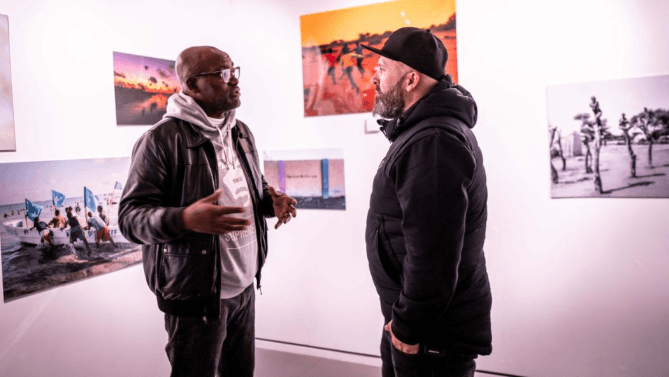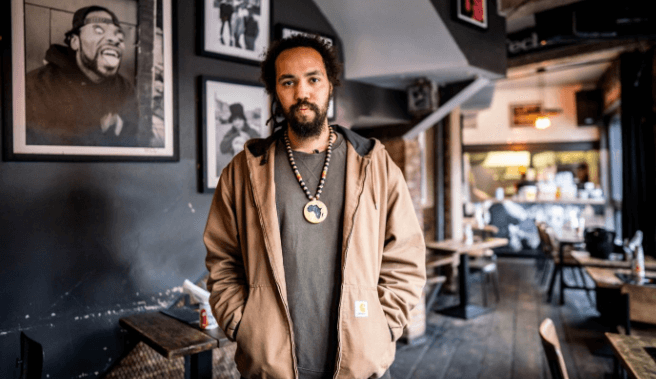 As part of the documentary “Back 2 Tape”, music journalist Niko Hüls meets two defining faces of British hip-hop: rapper Rodney P and producer and I Am Hip-Hop Magazine’s Apex Zero.
As part of the documentary “Back 2 Tape”, music journalist Niko Hüls meets two defining faces of British hip-hop: rapper Rodney P and producer and I Am Hip-Hop Magazine’s Apex Zero.
The roots of British hip-hop lie close to Buckingham Palace, in Covent Garden. The London theatre and entertainment district has always attracted people of all ages and backgrounds. Like other attractions in the British capital, Covent Garden is both historic and inspirational.
The will to create something of your own
In the 1990s, it was precisely here where hip-hop, with its essential basic elements of rap, DJing, breakdancing and graffiti, became part of urban culture. Initially underground, later more and more as its own fully respected culture of different generations. Early British hip-hop is an expression of a certain attitude towards life, just like its American counterpart.
It originates primarily from socially less privileged areas, mixed with influences from the reggae and ragga scene. In addition to the song “London Bridges” by the artist Newtrament, which was released on a British label in 1984, the beats of the local artists are mainly passed from fan to fan on tapes. You can feel the influence of the New York hip-hop scene at every corner in Covent Garden — but at the same time, there is a constant desire to create something of your own.
Trip-hop, garage or drum & bass: British hip-hop is unfolding, becoming more aggressive, louder. It gains respect beyond the borders of London’s West End, to Bristol, Manchester or Birmingham — and finally to the USA. Labels like Simon Harris’ “Music of Life” help the British scene enormously to break away from the US model.
Hip-hop is attitude
I meet Rodney P on my Porsche road trip in London. For many young artists, he is a shining star in the sometimes dark world of hip-hop. In his days, he was also known under the pseudonym Riddim Killa. Whenever his music got Caribbean influences, Rodney P became Riddim Killa. His first album was released in 1986, and later he founded his own label and hosted the BBC show “The Original Fever”, where he met rap legends like Kanye West, P Diddy and 50 Cent.

Rodney, who came to hip-hop through breakdancing and so-called freeriding, is massively disturbed by the negative lines and the lack of complexity in today’s rap business: “They all just write lyrics about crime and drugs,” laments the godfather of British rap. “But there is more. It’s not about landing the next millions with one hit. It’s about building a future for you and being able to look at yourself in the mirror.”
After all, for Rodney P, hip-hop is an important part of society: “Hip-hop connects with all its elements. Big and small, rich and poor, black and white. Many young people often ask me ‘Who is the greatest MC of all time?’ But that’s not the right question,” says Rodney P. “It has to be ‘Who is the most influential MC of all time?’, ‘Who shaped a positive rebellion in music?”.
African-Caribbean beats
Another proponent of the original idea of British hip-hop is Apex Zero. His home is in Brixton, my second stop in the British capital. The district south of London, on the other side of the Thames, is pulsating with African-Caribbean life. And that fits the Afro-English Apex Zero like the turntable pin fits in the grooves of the vinyl.
“Around the corner here is Electric Avenue. Do you remember the song by Eddy Grant?”, Apex Zero asks me and immediately tunes in to the song while his Rasta hair bounces with the beat. “This neighbourhood is so important for hip-hop, not only here but all over Europe. Just think of the Brixton Splash Music Festival or the Chip Chop Café,” says Zero, who has immersed himself in Beijing’s Chinese hip-hop scene for two years.

“Hip-hop showed me who I am”
Apex Zero, who co-founded a hip-hop magazine as a journalist in 2012, aims to preserve the roots of hip-hop: humanity and attitude. The magazine “I Am Hip-Hop” helps ex-criminals to regain a foothold in normal life after their release and offers opportunities for participation. “You can support the magazine by writing, participating in reporting or producing photos,” Zero explains.
“It’s important that hip-hop gives people a perspective, no matter where they come from. I owe a lot to the music. Hip-hop has shown me who I am and led me on the right path. Before, I just did crazy stuff and drifted off in different directions,” says Apex Zero, for whom hip-hop is always open and multicultural — but also threatened by media and commerce. “I’m sure: Good hip-hop will survive.” Apex Zero is definitely doing its part.
Back 2 Tape
In 2018, music journalist Niko Hüls embarked on a journey to the roots of hip-hop in Germany in “Back to Tape”. Now, he’s continuing his road trip across Europe in a Porsche Cayenne S Coupé. In coöperation with the hip-hop magazine Backspin.de, the Porsche Newsroom project “Back to Tape” sheds light on cultural influences through the four central elements of hip-hop: rap, DJing, breakdance and graffiti. In Part 4, Niko Hüls visits London.
Rishma
Latest posts by Rishma (see all)
- INTERVIEW | TRELL SAVONE: FROM BUNKIE TO THE WORLD WITH “SHINE” — June 30, 2025
- NEW MUSIC | MCSOLOMON AND DERAJAH ‘KINGSTON TO LONDON’ — June 30, 2025
- REDMAN RETURNS TO THE UK THIS SUMMER FOR HIS LONG AWAITED TOUR — June 26, 2025
